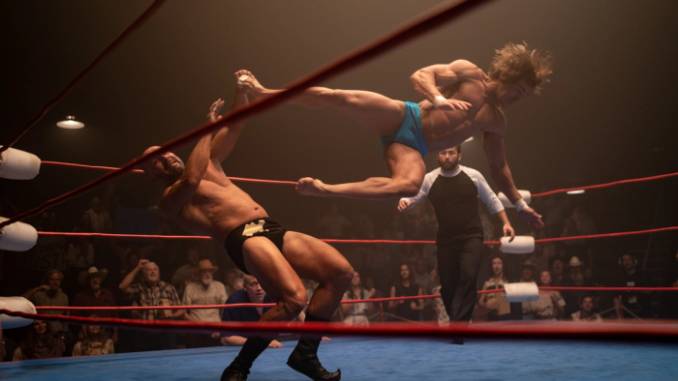Wrestling Biopic The Iron Claw Skips Some Facts, but Tells Emotional Truths

The Iron Claw interprets the tragic story of the Von Erich family, wrestling royalty known for the “curse” that saw three of five sons die by suicide before middle age. Through its thorough but not unlimited portrayal of the travails and triumphs of a legendary family of athletes, the film adds to ongoing debates about entertainment drawn from tragedy and what artistic license is acceptable in the adaptation of real events.
Writer/director Sean Durkin’s drama is largely carried on the broad strapping shoulders of Zac Efron as Kevin Von Erich, aided by Jeremy Allen White as his brother Kerry and a star turn by Harris Dickinson as their brother David. Stanley Simons rounds out the focal generation of the family as youngest brother Mike. Mike’s real-life youngest brother, Chris Von Erich, does not appear in the film and is not mentioned.
The Iron Claw starts in grayscale, as we meet Fritz Von Erich (Holt McCallany), a vicious wrestler who dreams of greatness, known for his signature move, “The Iron Claw.” After the match, he shows his wife Doris (Maura Tierney) and children that he’s replaced their car with a Cadillac despite their financial woes (their mobile home is hooked up to it). It’s the image his ambitions want to display to the world. The next thing we know, the film is in color, more than a decade has passed and the family lives in a ranch house in Denton, Texas, where Fritz owns and operates World Class Championship Wrestling.
So begins the family’s journey for a world wrestling championship, as the ambitious, controlling and emotionally abusive patriarch pushes his sons to greatness and peril. The Iron Claw is not obsessed with the technical business aspects of running a wrestling promotion, but rather the requirements and consequences at hand. Nonetheless, it’s held back from greatness in part by the depiction of Fritz, whose dialogue is written as such an expression of serial killer-adjacent, bootstraps moralism that it often feels like a rough draft of a stereotype. The upside of this is that the family truly appears to be victims of Fritz’s brusque and toxically old-fashioned manner, with the obvious caveat that he comes off almost cartoonish even though all his grown, muscular sons are more afraid of disappointing him than being physically hurt by him.
Kevin says their mother tried to protect the family with God, while their father tried to protect them with wrestling. But Doris is a non-character through long stretches of the film, despite a slightly-too-neat moment of liberation toward the film’s end. She’s more than set dressing, but her purely distant depiction often makes her more of an observer than a participant. Part of Doris’ purpose in The Iron Claw is expressing the family’s self-reliant ethos, as she—like her husband—refuses to talk to her sons about their emotional or personal problems. Even religion seems more like a personal refuge from any unstated misgivings she might have about who her husband has become than a blanket for the family (though they’re beloved at church).
In direct contrast, Kevin’s relationship with Pam (Lily James) is presented as much more wholesome and mutually affirming. Pam is a comfort to Kevin throughout the film and James is a comfort to us, as a kind and thoughtful presence that isn’t native to the world of wrestling but becomes beloved by the Von Erich clan. Still, she alternates between partner and passenger; the film focuses on the brothers, while she’s left to pick up the pieces of her breaking husband as disaster repeatedly strikes.
-

-

-

-

-

-

-

-

-

-

-

-

-

-

-

-

-

-

-

-

-

-

-

-

-

-

-

-

-

-

-

-

-

-

-

-

-

-

-

-








































